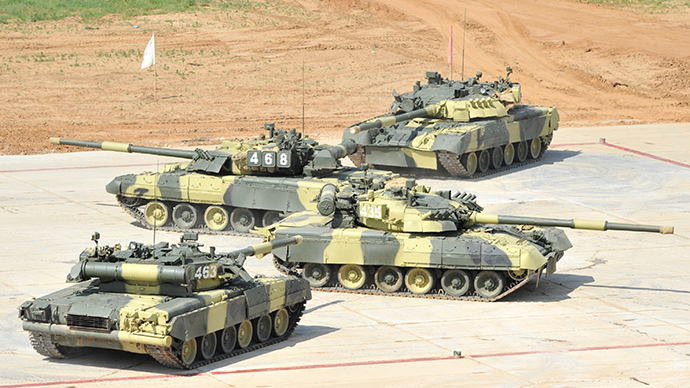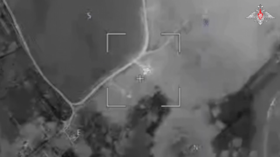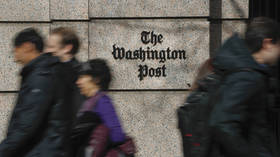Why is Russia lifting embargo on military supplies to Pakistan?

Russia has just announced a hugely strategic decision that may alter the regional power matrix and bug India at a time when the just-installed Indian Prime Minister Narendra Modi was looking to deepen ties with Moscow.
Sergey Chemezov, head of Russian state-run technologies corporation Rostec, announced on Monday that Russia has lifted an embargo on supplying weapons and military hardware to Pakistan. He also said that Moscow is negotiating the delivery of several Mi-25 helicopter gunships to Islamabad. "The decision was taken and we are negotiating the delivery of helicopters," the Voice of Russia quoted Chemezov as saying.
Why this move and why now?
The Russian decision is indicative of a paradigm shift in Russian foreign policy, a kind of move which one sees once in several decades.
Naturally, when a state takes such a decision it must not be without considering the pros and cons of the matter, the strategic takeaways and the possible pitfalls.
Two compelling reasons for the Russian move may well be Afghanistan and the Russia-West spat over Ukraine.
Like India and China, Russia too is waiting with bated breath the post-2014 Afghanistan as American/NATO are scheduled to pull out most of their troops from the land-locked country by this year end. The Taliban is in a resurgent mode. Everybody knows that during the Taliban rule (1996-2001), Afghanistan had become the most productive and flourishing factory of jihad in the world. Therefore, the withdrawal of American/NATO troops from Afghanistan by the end of 2014 may well turn the country into a tinder box again.
While Russia would definitely not like this scenario, it can hardly change the situation and counter the new situation with a Plan B. Pakistan’s importance would increase enormously in the post-2014 situation in Afghanistan.
Improving relations with Pakistan would give an important leverage to Russia in the post-2014 Afghanistan. If Russia and China do not want the loose canons of the Taliban to unleash themselves at them, then it is Pakistan and no one else that can make it happen.
The Russian move may be far shrewder than one can think. It may well be indicative of a China-Russia-Pakistan (CRP) axis, largely because of flawed policies of the Obama administration.
Russia and Pakistan have had a rather cold relationship, despite the latter’s sustained attempts over recent years to mend the ties. Reasons for the Russian coldness toward Pakistan are not difficult to see. It is the India factor. India clearly does not favor Russia cozying up to Pakistan and Russia could not have afforded to annoy the Indians. Why, after all, Russia should play a zero-sum game in South Asia when it is having the best of relations with India, a sworn enemy of Pakistan?
That was the argument of most Russians who opposed the very idea of needling India, the largest importer of Russian weapons. But even this defense relationship received setbacks in the past two years as Russia lost out to other competitors like Israel, the United States and Europe on several big-ticket Indian defense deals.
The India angle
Let me begin the India angle in this context with two seemingly contradictory statements.
One, the Russian decision of lifting its embargo on weapons supplies to Pakistan is a huge setback to India. Two, India and Russia will continue to do business together as both need each other immensely.
It is highly unlikely that the Russian move would have come as a complete surprise to the Indians. New Delhi has been aware of formal consultations between Russia and Pakistan in the trilateral format on Afghanistan – the third country being China.
It is quite possible that Moscow may have taken the Indians into its confidence on its upcoming policy change and put forth its strategic compulsions.
Russia and India are working very closely in the Afghan theater and have embarked on a novel understanding wherein India pays for Russian arms supplied by Russia to Afghanistan for boosting Afghan armed forces’ capabilities. Is there a possibility that the Russians have taken a sort of ‘no-objection certificate’ from the Indians for their unprecedented outreach to Pakistan?
One cannot rule out anything. Games such as these are often played on the strategic chessboards. What can be a bigger strategic chessboard than Afghanistan where all the top powers of the world are directly involved?
Moreover, one should not expect an official statement from either Moscow or New Delhi on this issue. Games such as these are often played in the back alleys, far from the media glare.
The statements, views and opinions expressed in this column are solely those of the author and do not necessarily represent those of RT.
The statements, views and opinions expressed in this column are solely those of the author and do not necessarily represent those of RT.













